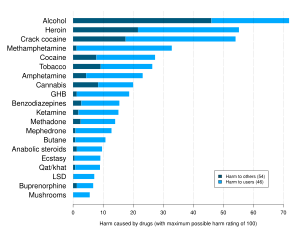
Alcohol and sex deals with the effects of the consumption of alcohol on sexual behavior.[2] The effects of alcohol are balanced between its suppressive effects on sexual physiology, which will decrease sexual activity, and its suppression of sexual inhibitions.[3] A large portion of sexual assaults involve alcohol consumption by the perpetrator, victim, or both.[4]
Alcohol is a depressant. After consumption, alcohol causes the body's systems to slow down. Often, feelings of drunkenness are associated with elation and happiness but other feelings of anger or depression can arise. Balance, judgment, and coordination are also negatively affected. One of the most significant short term side effects of alcohol is reduced inhibition. Reduced inhibitions can lead to an increase in sexual behavior.[3]
- ^ Nutt DJ, King LA, Phillips LD (November 2010). "Drug harms in the UK: a multicriteria decision analysis". Lancet. 376 (9752): 1558–1565. CiteSeerX 10.1.1.690.1283. doi:10.1016/S0140-6736(10)61462-6. PMID 21036393. S2CID 5667719.
- ^ World Health Organization, Mental Health Evidence and Research Team (2005). Alcohol Use and Sexual Risk Behaviour. World Health Organization. ISBN 978-92-4-156289-8.
- ^ a b Crowe, LC; George, WH (1989). "Alcohol and human sexuality: Review and integration". Psychological Bulletin. 105 (3): 374–86. doi:10.1037/0033-2909.105.3.374. PMID 2660179.
- ^ Abbey, Antonia; Zawacki, Tina; Buck, Philip O.; Clinton, A. Monique; McAuslan, Pam (August 18, 2001). "Alcohol and Sexual Assault". Alcohol Research & Health. 25 (1): 43–51. PMC 4484576. PMID 11496965 – via PubMed Central.